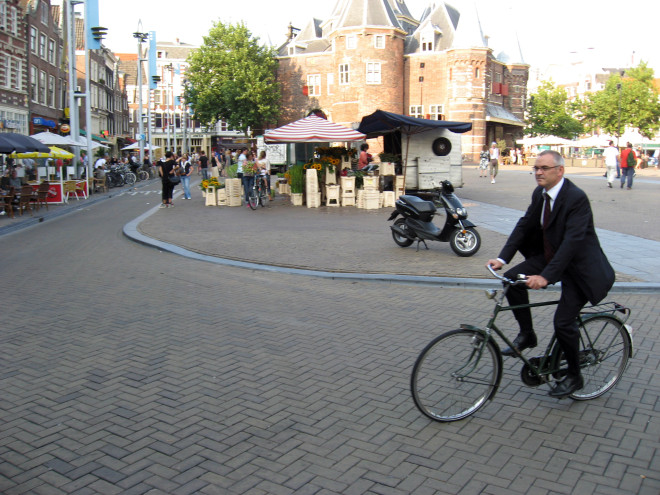
Is cycling a money printing machine? Shift to sustainable transport modes is good for the economy, new study finds
The German automotive industry is one of the largest industrial sectors in Germany and employs 730,000 people, according to its association VDA. Yet a shift to sustainable transport would grow the economy and create much more new jobs than lost in the automotive sector, a German study finds.
Recently ECF reported that for every new car almost two bikes were sold currently in Europe. Forbes picked up the story, asking in its header whether e-bike sales reduce car sales in Europe. The magazine didn’t give a final answer, but ends its article with a reference about the fun of commuting by bicycle, compared to driving.
For ECF, the increase of livability in Europe’s towns and cities that comes with more cycling and less driving is an argument that can stand on its own. But a new study done by research institutes Fraunhofer, INFRAS and IFEU, and commissioned by the German Environmental Agency, sheds new lights on why we also should shift for economic reasons to sustainable transport.
The researchers compared a Business as Usual (BAU) scenario against 5 other scenarios with horizon 2030. Scenario 1 looks into the effects of an increase of 10 % of walking and cycling in the modal split in urban areas, against the BAU scenario. As a consequence, by 2030, German GDP would increase by 1.11 %, employment by 1.37 %. On the environmental side, air pollutants would be down by between 5 – 10 %, CO2 by about 2 %. To achieve this aim, the researchers assume that annual investments of about € 1 bn are needed for upgrading walking and cycling infrastructure. The money could be taken from congestion charges and parking fees, the researchers say.
Albeit a GDP increase of 1.11 % by 2030 may not sound impressive at first sight, it still represents about € 29 bn, based on German GDP in 2012. This figure cannot be easily extrapolated to the whole of Europe’s economy: Due to higher mortality rates in the European average than in Germany, regular physical exercise would yield higher health benefits than in Germany. The health benefits that come with regular walking and cycling were included in the study. Also, the German automotive industry sector is larger than in any other European country. Not taken these two factors into account, a 1.11 % increase in GDP would translate into economic growth of € 141bn in the EU-27 (based on GDP of EU-27 in 2012). This figures matches well with the findings of an ECF in-house calculation we did on the current economic benefits of cycling in the EU-27, to be published next week on the occasion of the gathering of transport minister from OECD countries during the annual International Transport Forum in Leipzig.
Higher economic activities due to modal shift: Where does this leave industrial policy that has had often an open ear for the car lobby in the past? Certainly, it produces renewed criticism about the meaningfulness of scrappage programmes during the recent financial crisis where numerous European governments promoted the replacement of old cars by new vehicles. The German scheme was the largest one with a budget of € 5 bn in 2009. Also, EU policy is focusing on strengthening the EU’s automotive industry. The lesson learnt from this study is: It should rather think very hard how it can support a shift from polluting to sustainable means of transportation.
About the Author
 Fabian Küster is a Senior Policy Officer at the European Cyclists’ Federation. He has previously worked in Brussels for a German Member of European Parliament and the German Embassy. He has wealth of experience in and around the EU institutions, and is an expert in the EU policy field of bicycles
Fabian Küster is a Senior Policy Officer at the European Cyclists’ Federation. He has previously worked in Brussels for a German Member of European Parliament and the German Embassy. He has wealth of experience in and around the EU institutions, and is an expert in the EU policy field of bicycles
- Log in to post comments
Contact the author
Recent news!
Upcoming events
Contact Us
Avenue des Arts, 7-8
Postal address: Rue de la Charité, 22
1210 Brussels, Belgium










